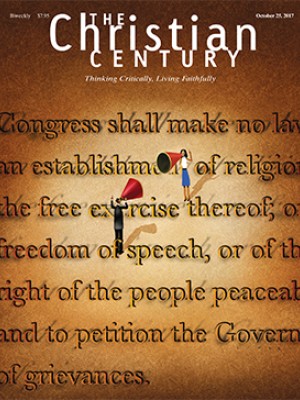November 26, Reign of Christ A (Matthew 25:31-46)
The criteria for separating sheep from goats do not include a confession of faith.
In his younger days, my father was something of a walking miracle. He survived a host of death-dealing events, among them a fall through the ice, a rattlesnake bite, a massive exposure to rabies, and a double diagnosis of melanoma (not all at the same time, of course!).
In his fifties he came back from a stroke. At 60 something, he convinced his doctors to release him from the hospital only two and a half days after quadruple bypass surgery. At 71, just a few months after his pelvis was crushed beneath the wheels of a passenger van, he was back to work, lecturing at the veterinary school and advising local ranchers on best practices to keep their livestock healthy. He finally quit his job at age 78, but only because his employer offered an early retirement bonus.
Read our latest issue or browse back issues.
In his early eighties, however, he was stricken by a neurological illness called Lewy body dementia (the same disease that afflicted comedian Robin Williams). Before long my active, energetic father was confined to a hospital bed at home. As the disease progressed, his hands contracted like claws, which we stuffed with wads of cloth to prevent the fingernails from gouging holes in his palms. Unable to turn or shift his body, he was powerless even to scratch his own nose. Cognitive abilities deteriorated in tandem with the physical decline. When he could no longer swallow, the palliative care nurse showed us how to dip a sponge in juice and hold it to his lips.
By this time the evidence was clear. There would be no more miracles.
Then they began to appear at the doorstep. Miracles arrived in the form of women and men who, for more than six years until my father’s death, blessed my family with their offerings of food, friendship, service, and love. They were a living example of the people “from among the nations” who are invited to move to the Lord’s right hand in Jesus’ parable of the sheep and the goats.
They came as visitors and caregivers from as far as Fiji and as near as the next block. Employed and voluntary, paid and unpaid, they prepared meals, cleaned the house, took my mother out for lunch, or dropped by to share a smile and the bounty from their gardens. They sent cards, knitted prayer shawls, listened to our stories, and held us in our grief. They soothed our family’s spirits as they attended to my father’s needs.
A few of the people who visited regularly were members of local churches, including the church to which my parents had belonged for more than 60 years. Although we never discussed their motivations, I feel certain that their actions sprang from a desire to love God by loving their neighbor, and to love their neighbor through their love for God. My family benefited enormously from their faithfulness.
Others who passed through the door of the house did not identify as followers of Jesus; they were from different religious traditions or from no religion at all. Nevertheless, they too enveloped us in the kind of love that flows from the heart of God.
Their compassion reflects the parable’s criteria by which the sheep and goats will be distinguished: through acts of mercy such as feeding the hungry, giving drink to the thirsty, welcoming the stranger, clothing the naked, caring for the sick, visiting those who are imprisoned.
To be sure, the ethics outlined here are inextricably bound to the Christology of Matthew’s Gospel. We see this reflected in the titles for Jesus that appear in the parable. As Son of humanity (or Son of man) Jesus is the one who is to come (Matthew 10:23); he gives his life as a ransom for many (20:28). As Shepherd he is the compassionate leader of his people (9:36) who rescues the single stray sheep (18:12). As King he stands in the line of David (2:1–3), and as Lord he has the power of God to heal (8:2). The one who separates sheep from goats is none other than the Messiah, crucified and raised, who has the authority to judge as well as forgive.
Yet even as the parable reflects Matthew’s portrayal of Christ, it also suggests that the criteria for separating sheep from goats do not include a confession of faith. On days when my family longed for evidence that God was present through the heartbreaking journey of my father’s illness, believers and nonbelievers alike were the miraculous people who provided it. They were blessed by God with a capacity to serve.
We knew them by their fruits. One caregiver arrived each evening before dinner and stayed until after breakfast, voluntarily rising from sleep to check that all was well. Another read aloud from All Creatures Great and Small, James Herriot’s delightful memoir of his life as an English country veterinarian. It was a joy to hear my father’s laughter as he recalled snippets of his experience reflected in those stories—even on days he could not remember the names of his own children. A nurse arrived regularly to attend to his physical needs, while members of a Threshold Choir chapter filled the house with gentle music during their weekly visits.
Their actions embodied the people in the parable who are gathered like sheep at the right hand of the Lord. The ones who are proclaimed righteous before the heavenly throne are those who have loved God by serving Christ, and the way they have served Christ is by loving their neighbor. Praise God for miracles such as these.





